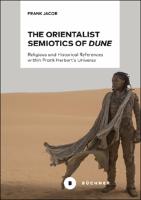The Orientalist Semiotics of Dune
Religious and Historical References within Frank Herbert’s Universe
Abstract
Frank Herbert’s »Dune« (1965) is considered to be one of the most successful Science Fiction novels of the 20th century. It introduces its readers to a future universe, in which the production of the most valuable resource of the universe – ›spice‹ – is only possible on one vast desert planet called Arrakis. »Dune« offers many different motifs, including a hero that eventually turns into a superhuman being. However, the novel is also rich of orientalist semiotics and relates to a sign system existent when Herbert wrote his book. Frank Jacob discusses these semiotics in detail and shows how much of »Lawrence of Arabia« is present in the story’s plot.
Keywords
Lawrence of Arabia; Frank Herbert; Paul of Arrakis; Paul Atreides; colonialism; Dune; human collectivism; human-animal relations; T.E. Lawrence; political elitism; semiotics; science fiction; Denis Villeneuve; cross-generational audience; ecology; desert planet; religion; orientalismDOI
10.14631/978-3-96317-851-1ISBN
9783963173028, 9783963178511Publisher
Büchner-VerlagPublication date and place
2022Classification
Media studies
Films, cinema
Science fiction
Literary studies: fiction, novelists and prose writers


 Download
Download Web Shop
Web Shop